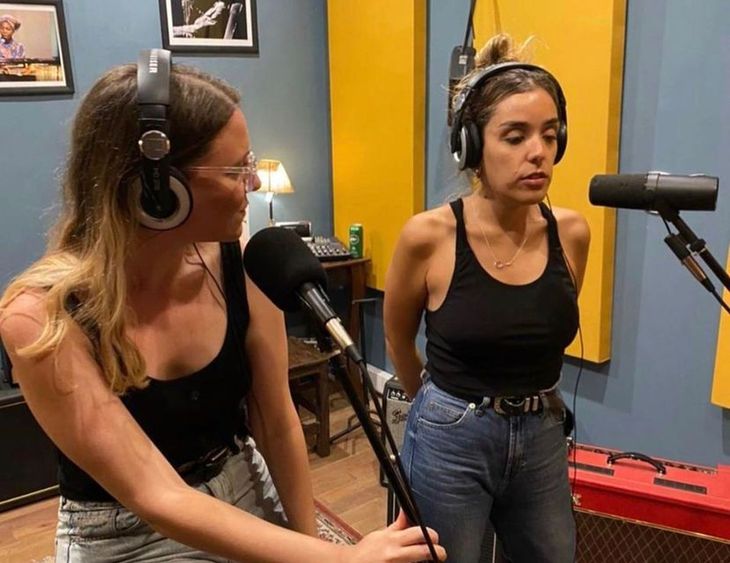Fruit of their alliance was born “How to Get Discs”, a podcast that covers the history of Buenos Aires record stores and the characters that inhabit them, focusing on the relationships that are woven between buyers and record stores.
“There is a lot of talk about music and records, but nothing is said about the history of record stores, which are the places where one goes to look for their music. Nor about the relationship or the importance they have in the life of any person who buys music” their creators explain to Ambit.
cross roads
The stories of the interviewees are told in parallel. Puebla grew up in Quilmes and is a translator; Miranda, a native of Tucumán, works in digital marketing.
Both are 36 years old and both came to their first vinyl without having equipment to listen to them. Both place their initial experiences in 2010. At that time, the current boom was unthinkable and everything cost more. It was thanks to their respective partners that they got the trays to listen to them. After that rapprochement, there was no turning back.
Their incipient hobby led them to begin a long pilgrimage through record stores. There they got titles, strengthened their collections and gained friends, but they also suffered for being women in an environment that defies interference. Even today they recognize that “being a woman in collecting is an aggravating circumstance”.
In 2020, in full quarantine, “Lucha” launched a cycle of talks about records on Instagram called “Emotional Rescue”, in which Puebla was invited to participate. Their conversation lasted for about two hours and kept the followers attentive. There they noticed that they were in tune.
“I wanted to do something related to the world of records. One day we got together to have a beer and we spent hours shooting ideas, until we found the way to what could become the podcast. That’s how ‘How to get records,'” says Sol.
Miranda completes: “We realized that we had something to do together, that we loved music and that we had had to suffer certain similar things with some bad record companies.”
Vinyls.jpg
let it bleed
With the decision made, they outlined the roadmap: “We wrote which were the record stores that we liked the most, which were the most representative for the history of each one and which were those record stores that when we were girls we were more afraid to go. All those things together went off shooting”.
There was a quorum: they selected the premises and launched into the adventure. It would be 10 episodes. But it wasn’t easy. At first they didn’t have much to show. His cover letter was his ideas, his desire to do things and his musical knowledge. Nothing tangible. To make matters worse, they started with the old school record stores, the most difficult to approach.
“It was still a project in our heads. Some of us had a harder time than others, but finally they said yes, they were cool. That’s when we started organizing interviews, we put together a model questionnaire for everyone, so as to get their opinions on certain specific issues, and then each one resuming their individual course”, they count.
To learn more about the format, they spent hours listening to podcasts and turned to journalist Lucía Cholakian Herrera, who advised them with material and some guidelines for writing the script. With all that digested, they went to Rumble Studios and started recording.
May 4 was D-Day. “How to Get Records” began to spin on Spotify. The release was called “Track 1: Exiles Records – Exile in Honduras street”. Stone reference in between, the chapter lasts 22 minutes and is dedicated to Exiles Records, one of the most recognized record stores in Palermo.
Throughout the ten episodes, the podcast combines personal stories from its creators with testimonials from record companies, both from classic and recent stores. “We as a duo work. We get along, we can finish off the jokes. What she doesn’t know I know and vice versa, and if we don’t know, we have no problem going to look for it”, reflects “Lucha”.
Vinyls.jpg

The times they are A-changin
An interesting edge is that the podcast not only investigates record stores as abstract institutions, but also aims to learn more about the figure of the record store.
The record company is not an average seller; Decisions about other people’s beauty pass through him. He advises, advises and also scolds. And while not everyone is the same, the old guard often put their potential customers to the test. Passing the test is essential to establish a relationship at least cordial.
In the words of Puebla: “A record player is a person who understands that you have a particular hobby. He lives it that way. With him you find a pair. It doesn’t matter if you entered with 20 thousand quilombos and the record store opened the record store with 20 thousand quilombos. At that moment, you are talking to a guy to whom you say, for example, ‘I sleep with this record’, and he understands it because it happened to him. If I tell a friend who doesn’t collect, he’s going to tell me ‘you’re ridiculous’”.
https://graph.facebook.com/v8.0/instagram_oembed?url=https%3A%2F%2Fwww.instagram.com%2Fp%2FCW8IFwElc4p%2F&access_token=EAAGZAH4sEtVABAKj2FhSqKISxkyLvww8PmeriLfLkb8mEDelELs8nPUbHt2CsWORtDVU6dIiXe0h2ES08aNRuJhUAwBJDYLgqzPpBiAIBZC1xOK0rsYkLrZBDcxFsTQSQzptyNIbwoaZArb3DfVvfsNnrNfden1dcVrkrgZAo9gZDZD
In this regard, it is worth highlighting the fifth episode, dedicated to “El Gallo Cantor”, the city’s historic record store, whose owner, the Uruguayan Hugo Latorrechivalrously accepts the title of “record store villain”. “I have two fames: that I am expensive and that I treat people badly. Both are true.” admits at the beginning of an interview not without tensions.
“That show was very special. It was a lot of work to tackle it. Hugo was very generous with us, but he was also very controversial. He made us rethink the position with which we want to address people who speak that way. We reaffirmed our ideas and, at the same time, we said ‘I don’t want to put my banner here, but I’m not on your side’. I think that, apart from the fact that it is a spicy chapter, it taught us a lot, ”says Miranda.
Such experiences, sometimes good, sometimes bad, are part of the whole experience of collecting vinyl. Puebla explains: “This seemed very interesting to us. Of the records that I have, I remember who recommended them to me, if I went to the record store to look for one thing and I took another, if I went five months in a row to break the record store every day to see if I could get such a record until I I got it.”
Pleasant dreams
Although the project began as a pilot test, its creators are already thinking about the future: “We really want to see how to make a tour of record stores in the provinces. That is a wish. For now we are going to continue with some from here, from the Province of Buenos Aires. The balance is super positive, we learned a ball”.
In addition to the podcast on Spotify, “How to Get Records” has an Instagram account, where Puebla and Miranda expand the experience. There you can find guides and information on record stores in France, Spain, the United Kingdom, Brazil and Uruguay, the result of his travels through those countries.
https://graph.facebook.com/v8.0/instagram_oembed?url=https%3A%2F%2Fwww.instagram.com%2Fp%2FCe3Yl2OLGHm%2F&access_token=EAAGZAH4sEtVABAKj2FhSqKISxkyLvww8PmeriLfLkb8mEDelELs8nPUbHt2CsWORtDVU6dIiXe0h2ES08aNRuJhUAwBJDYLgqzPpBiAIBZC1xOK0rsYkLrZBDcxFsTQSQzptyNIbwoaZArb3DfVvfsNnrNfden1dcVrkrgZAo9gZDZD
“Buenos Aires has nothing to envy to other cities. You have different places and in each one you will find a particularity that gives you a perspective of what we consume, in this case, the people of Buenos Aires. That’s what record stores also have: they give you a screenshot of what the people who live here consume. And there are beautiful characters”, summarizes Luciana.
Before concluding, Puebla vindicates her love for vinyl, which is “what she likes the most”: “Almost everything I do, I do it thinking about the next album I’m going to have. I really like having the music that I like in a format you can enjoy. Maybe at the record store you don’t buy a record, but you kept talking, you kept stirring and you don’t realize it. You come out of it renewed, it’s like a kind of mini-therapy that adds a lot to you in this super frenetic world”.
“Our logo is pink. There is something to soften the milanese, as Pappo said to scare Charly. Some of enough people from another generation who think that music and collecting is only for them. They put themselves on a pedestal of knowledge. The more we listen to music in material format, the better for the industry, the better for the artists, the better for us too, to connect with a work from another place”, Miranda closes.
Source: Ambito
David William is a talented author who has made a name for himself in the world of writing. He is a professional author who writes on a wide range of topics, from general interest to opinion news. David is currently working as a writer at 24 hours worlds where he brings his unique perspective and in-depth research to his articles, making them both informative and engaging.




